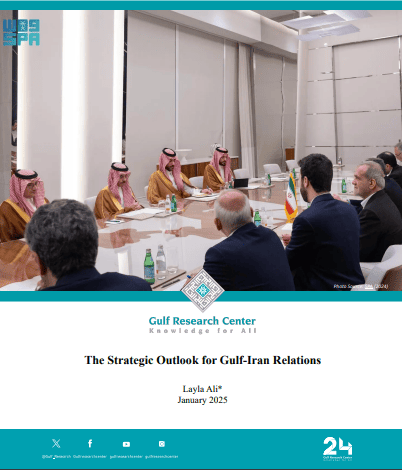
Shifting dynamics in the Middle East suggest a decline in Iran's regional influence. Tehran's grip has clearly weakened as actors that have depended on Iran’s support have been recalibrating their strategies. This can be seen in Syria following the removal of Bashar al-Asaad on December 8, 2024. Similarly, in Iraq, concerted efforts to curtail the power of Iranian-backed groups are gaining traction, with Baghdad trying to assert greater autonomy in its decision-making processes. Lebanon, too, is undergoing a transformative phase with the formation of a new government that is less beholden to Iran’s interests. This chain reaction of minimizing Iranian influence across key areas could further continue, with Yemen a possible next frontier in this ongoing process.
As a result of the above, Tehran’s regional posture has shifted from offensive to defensive as it contends with containment strategies and internal and external pressures. This shift reflects a broader weakening of Iran’s ability to project power and manage its network of proxies, known as the Axis of Resistance, which is no longer as formidable as it once was. Yetwhile Iran’s influence and action that has historically threatened Gulf security has weakened as of late, concern over the future direction of Iran’s policy vis-à-vis its neighborhood remains.
Internal and External Factors in GCC-Iran Ties
GCC-Iran relations are constructed of both internal and external dimensions. Internally, ties are fundamentally shaped by a defensive policy approach rather than that of a strategic partnership. There are no direct common interests that bind the two sides beyond a shared desire to mitigate potential threats. The Gulf's approach is rooted in safeguarding stability, with no substantive engagement or alliance defining relations to Iran. Instead, the focus remains on addressing critical areas of concern: the principle of non-interference in internal affairs, ensuring freedom of navigation, and upholding sovereignty regarding external relations with other global actors.
Efforts are concentrated on minimizing Iranian interference in these three key dimensions, reflecting a broader commitment to protecting regional security and autonomy and asserting the principles of sovereignty and independence in the face of persistent challenges posed by Iranian policies. One main concern for Saudi Arabia is Iran's commitment to non-interference policies in the Kingdom and the wider Arab region. Saudi Arabia emphasizes that bilateral discussions should stress "the necessity of non-interference in internal affairs'' and that regional security issues must be part of continued talks. From the Saudi perspective, there remains the need for Tehran to review its regional policies and to clearly show that the Islamic Republic is ready to pursue a more cooperative relationship.
Externally, the Gulf's relationship with Iran is influenced by a triangular dynamic involving the United States and Israel. Policies and actions by these two actors—ranging from measures addressing Iran’s nuclear ambitions, countering Hezbollah’s influence, and addressing Iran's role in Syria to U.S. strategies for containment of Iran and support for Israel—significantly shape the broader regional context. The U.S. and Israel remain focused on curbing Iranian influence throughout the region, a priority that aligns with GCC interests but involves factors beyond the Gulf's direct control. This underscores the multi-layered complexity of this triangular interaction.
A significant challenge facing GCC states is the unpredictability surrounding the actions of key players like the United States and Israel toward Iran. With no clear direction from the U.S., particularly during the Trump administration, and ongoing debates within Israel about whether to capitalize on the current geopolitical environment to launch an attack on Iran’s nuclear program, the situation remains precarious. This dynamic complicates Gulf states' ability to strategize effectively, as decisions by these external actors could reshape the region’s security landscape.
Balancing Rapprochement and Containment: A Dual Policy Approach
For the GCC states, managing relations with Iran therefore, requires a carefully calibrated dual policy. On the one hand, diplomatic engagement with Tehran is necessary to maintain communication channels and address shared concerns. On the other hand, there is a strategic imperative to limit Iran’s influence across the region, particularly Tehran’s interventions through military support and proxy networks in various countries. These two objectives—rapprochement and containment—must be approached as distinct yet complementary efforts.
Diplomatic relations with Iran are a pragmatic means of reducing tensions, avoiding unnecessary escalations, and preserving regional stability. This approach allows Gulf states to engage with Iran while at the same time raising issues of concern. By separating the political engagement from the broader containment strategy, Gulf states can avoid conflating dialogue with acquiescence. Instead, dialogue is seen as a pragmatic tool for managing tensions and addressing specific issues, while the broader stance may still involve opposing or resisting Iran’s regional ambitions.
The GCC states are thus pursuing a policy that remains vigilant but which is also adaptive, recognizing that Iran’s capacity to threaten the region is constrained and that its defensive posture offers new opportunities for regional stability. Underlying this approach is the assessment that the gradual decline in Iran’s role across the region is less a result of Tehran altering its policies and more a reflection of changing strategies by other powers, which now often favors direct confrontation over appeasement.
Strategically, the focus remains on countering Iran’s influence at the regional level. This includes supporting efforts to curtail its military and ideological reach in countries where it has entrenched itself, such as Syria, Iraq, Lebanon, and Yemen. By prioritizing these containment measures, GCC states can work toward eliminating Iran’s illegitimate presence in the region while continuing to engage diplomatically on matters of mutual concern.
The GCC states also use this dynamic as a means to deepen their involvement in stabilizing regional hotspots. For instance, Saudi Arabia has taken a proactive role in fostering dialogue and working toward a stable political future for countries like Syria and Lebanon. This was evident when Riyadh hosted the expanded ministerial meeting on Syria on January 12, 2025, bringing together key stakeholders to address the ongoing crisis, demonstrating a concerted effort to align regional actors in pursuit of shared objectives. During the meeting, the Foreign Minister of Saudi Arabia, Prince Faisal bin Farhan, “praised the positive steps taken by Syria's new administration, including its commitment to preserving state institutions, combating terrorism, and initiating a political process that incorporates all components of Syrian society. These efforts, he stated, contribute to Syria's stability and territorial integrity, ensuring it does not pose a threat to regional security.”
Through initiatives such as the expanded ministerial meeting on Syria and deeper engagement with Iraq and Lebanon, Gulf states are not only addressing immediate crises but also shaping a longterm vision for regional stability that limits Tehran’s influence. These actions therefore reflect a calculated effort to capitalize on Iran’s constrained capacity.
By emphasizing principles like non-interference, sovereignty, and freedom of navigation, the GCC states reinforce their commitment to stability while carefully managing relations with Iran. This nuanced approach allows them to maintain dialogue without compromising their broader goal of containing Iran’s influence. The question that now remains is whether Iran will also use this moment to rebuild trust and foster collaboration with the GCC states. Renewed diplomatic efforts, grounded in mutual respect and shared interests, could pave the way for a more stable and cooperative future in the region. Yet, the jury is still out on whether Tehran is ready to prioritize regional stability over continued ideological expansion.
*Layla Ali is a Researcher at the Gulf Research Center (GRC).

